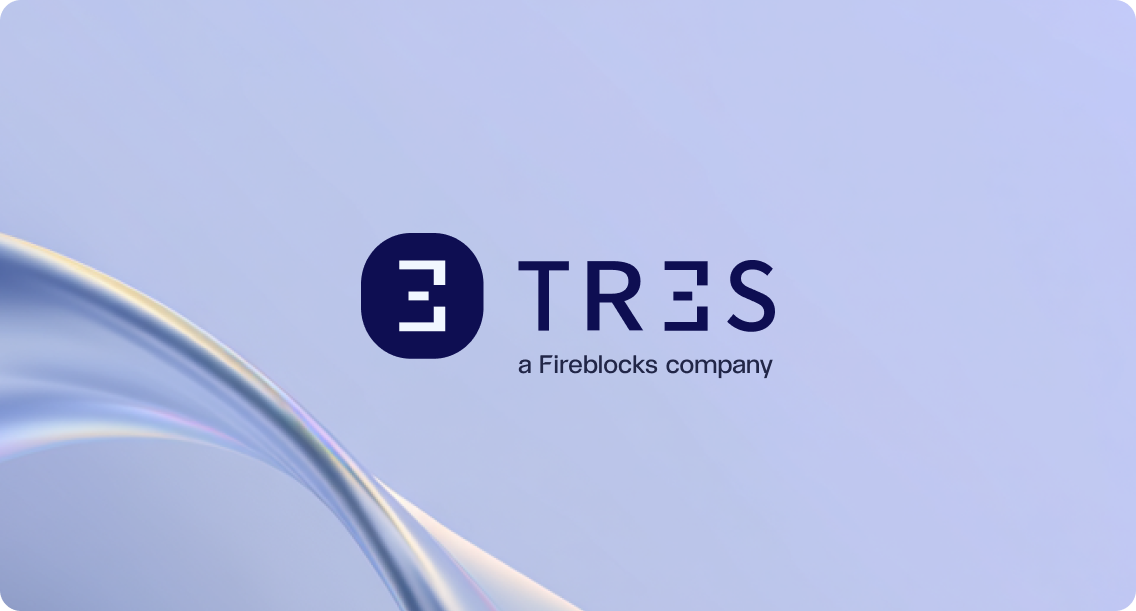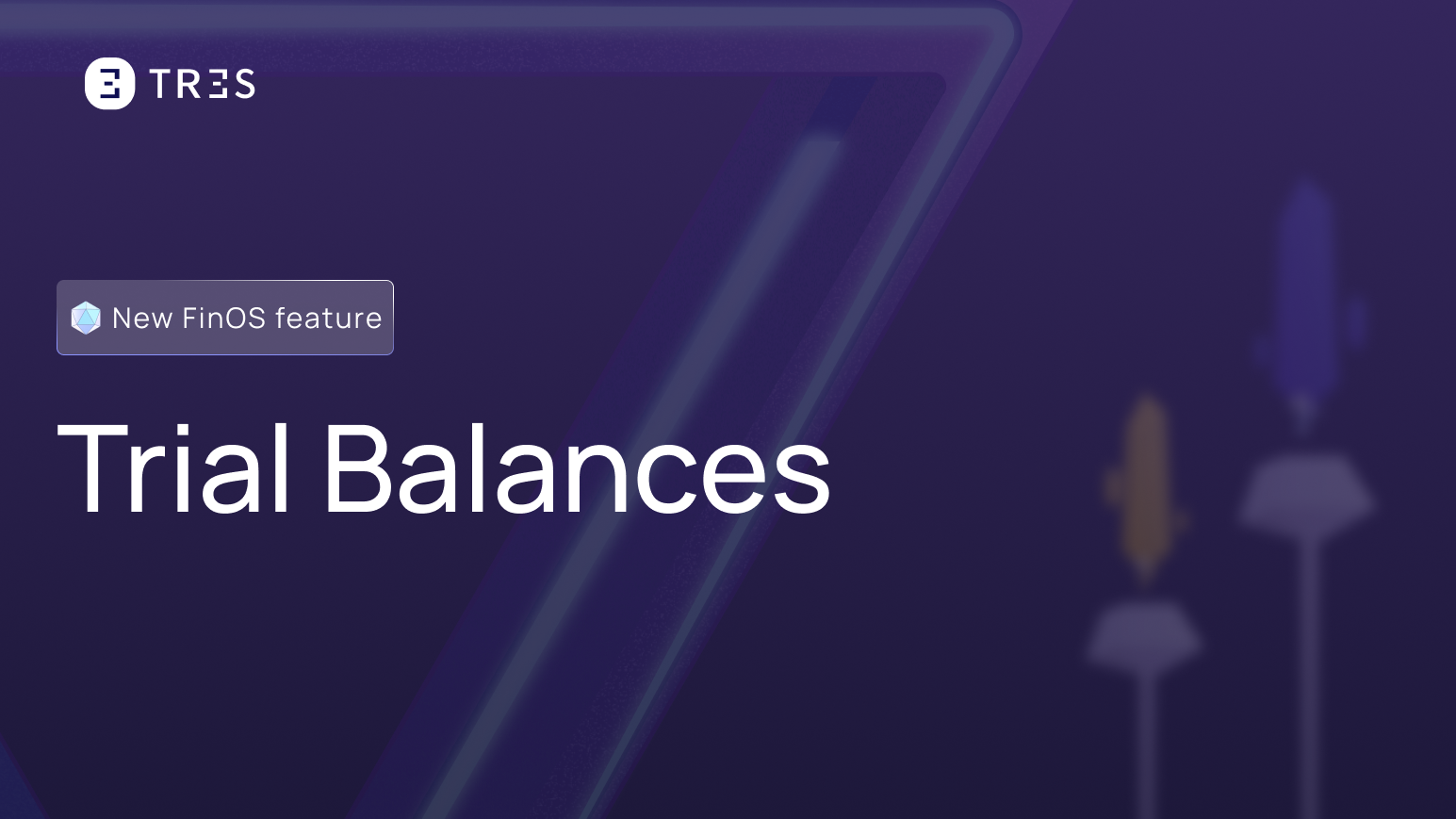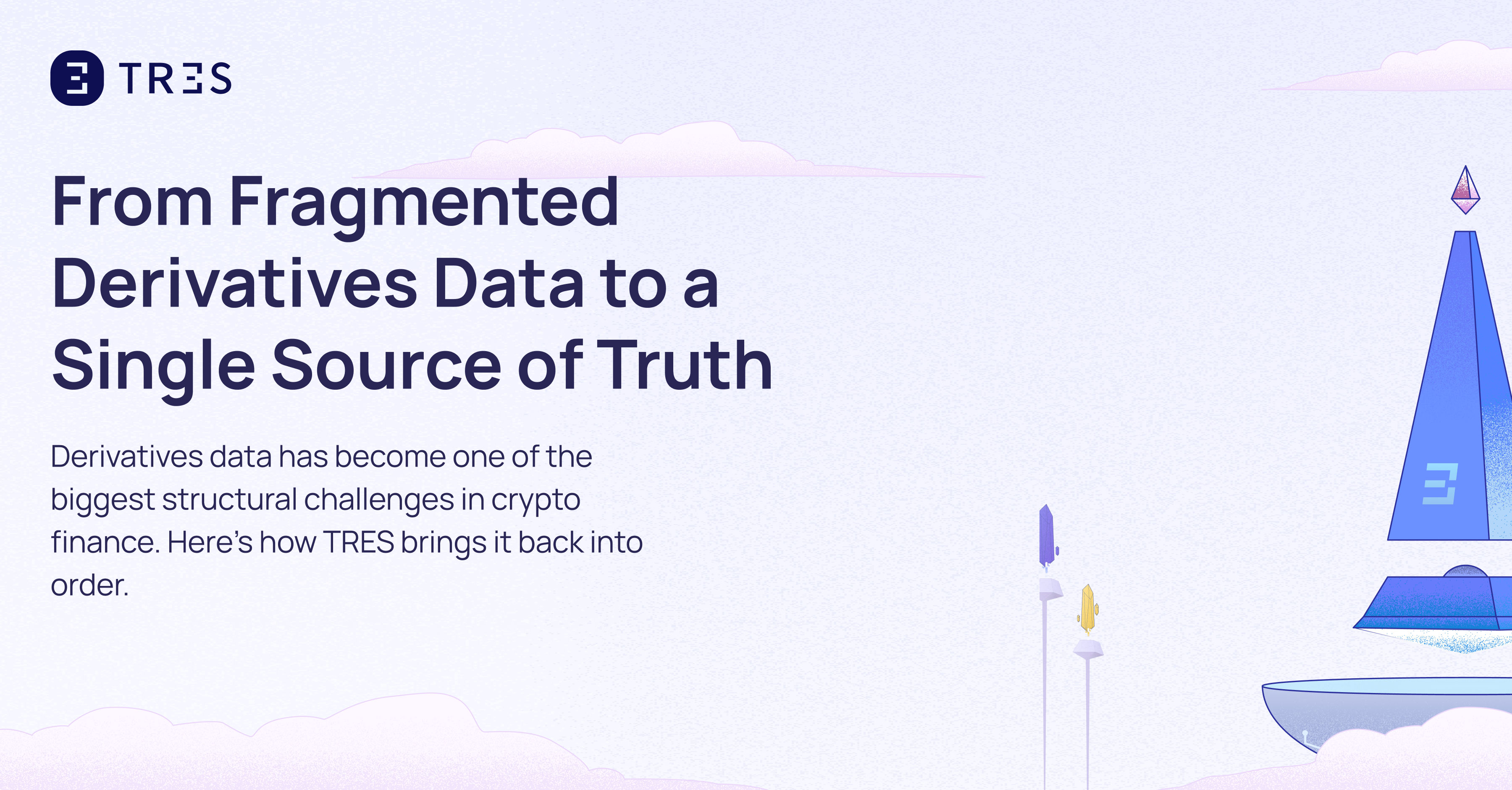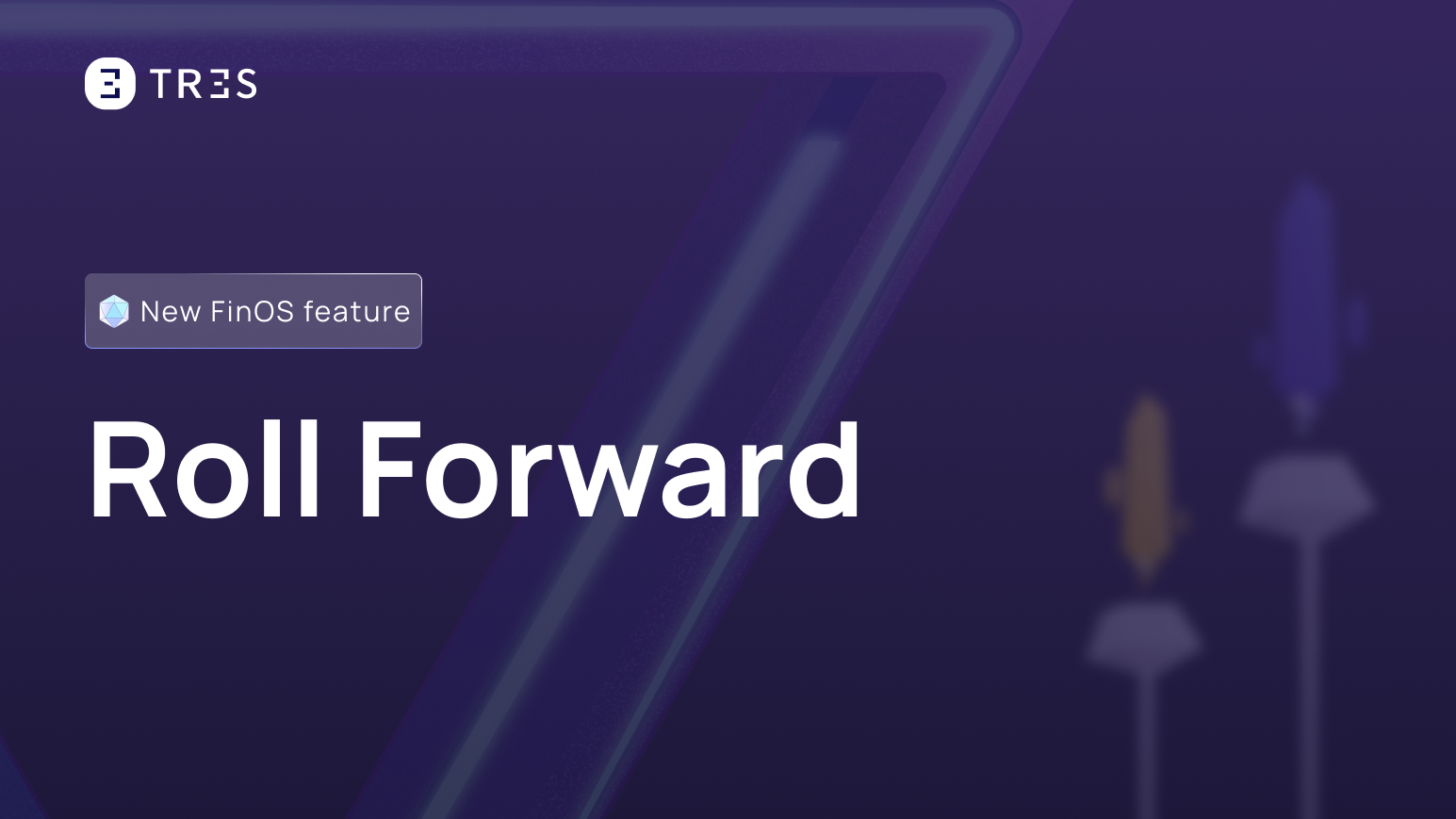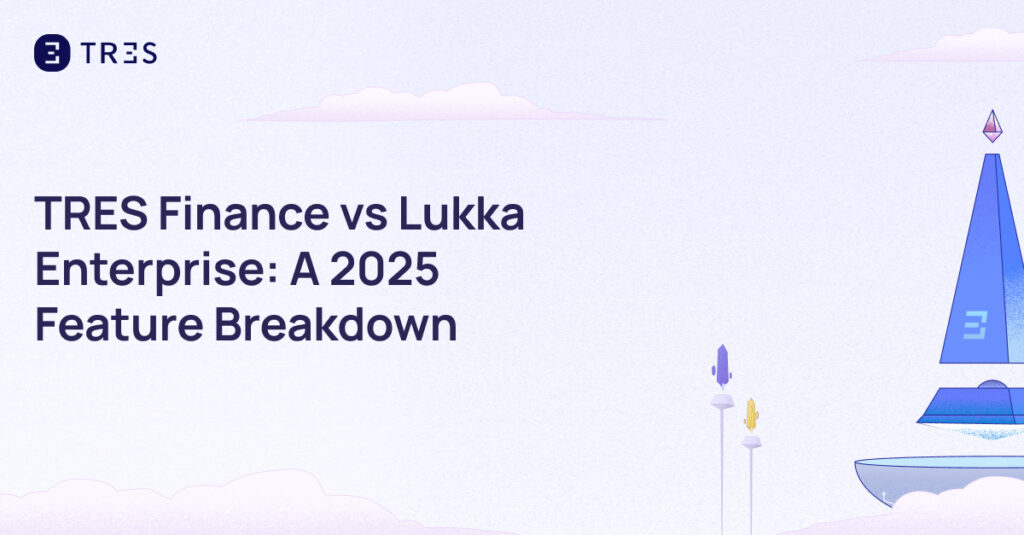
TL;DR: The crypto accounting landscape shifted in 2025 when Lukka Enterprise transitioned away from accounting solutions to focus exclusively on data infrastructure. TRES Finance now stands as the leading comprehensive accounting platform, while Lukka serves organizations needing raw data feeds without accounting functionality. The choice is no longer between competing accounting platforms—it’s between a full accounting solution and a data-only service.
Introduction
Enterprise crypto accounting software pricing often dominates initial vendor discussions, but for CFOs who’ve implemented these platforms, the conversation quickly shifts to operational ROI. A platform that costs 30% more upfront but automates reconciliation workflows can deliver positive ROI within quarters through reduced manual labor, faster closes, and eliminated audit findings. Conversely, selecting based on price alone can create technical debt that compounds with every transaction.
The enterprise market has undergone a significant transformation in 2025. Lukka Enterprise, previously positioned as a comprehensive crypto accounting platform, has pivoted its focus exclusively to data infrastructure services. This strategic shift fundamentally changes the competitive landscape—organizations can no longer compare Lukka and TRES Finance as equivalent accounting solutions because they now serve different needs entirely.
For finance leaders evaluating platforms in 2025, understanding this distinction is critical. TRES Finance provides end-to-end crypto accounting infrastructure: data ingestion, transaction categorization, reconciliation automation, audit trail generation, and regulatory reporting. Lukka Enterprise now offers raw data feeds and blockchain intelligence without the accounting layer that finance teams require for GAAP compliance, audit preparation, or financial statement generation.
This architectural difference manifests in daily operations. A data service provides transaction information—what happened on-chain and when. An accounting platform interprets that data within accounting frameworks—categorizing transactions, calculating cost basis, generating audit trails, and producing financial statements. Finance teams using data-only services must build their own accounting logic, either through internal development or third-party solutions.
This feature breakdown examines what TRES Finance delivers as a comprehensive accounting platform versus what Lukka Enterprise provides as a data infrastructure service, helping organizations determine whether they need accounting functionality or simply raw data feeds.
Understanding the Data vs Accounting Divide
The distinction between data services and accounting platforms has become critical as the crypto market matures. This isn’t merely semantic—it represents fundamentally different value propositions with distinct use cases and organizational requirements.
Data services focus on aggregation, normalization, and delivery of raw blockchain information. These platforms excel at monitoring on-chain activity, providing transaction feeds, and delivering market data. Lukka’s pivot to data infrastructure positions it alongside services like blockchain explorers and market data providers rather than accounting platforms.
Accounting platforms build on data infrastructure but add essential layers that finance teams require: transaction interpretation within accounting frameworks, automated journal entry generation, cost basis calculation, audit trail documentation, and regulatory report production. TRES Finance operates at this level, providing the complete stack from data ingestion through financial statement generation.
The market need for both types of services is legitimate but serves different organizational functions. Data services support analytics teams, trading operations, and risk management functions that need raw blockchain intelligence. Accounting platforms serve finance departments that must produce GAAP-compliant financial statements, prepare for audits, and file regulatory reports.
Organizations evaluating vendors must first determine their primary need. If the goal is monitoring blockchain activity, analyzing transaction patterns, or feeding trading algorithms, data services may suffice. If the goal is closing books, preparing audits, or generating financial statements, comprehensive accounting platforms become necessary.
The confusion often arises because accounting platforms necessarily include data infrastructure—you cannot build accounting functionality without reliable data feeds. However, data infrastructure alone does not constitute accounting functionality. This is the fundamental shift in Lukka’s market positioning.
TRES Finance is an enterprise platform for cryptocurrency management that focuses on creating audit-ready data and supports more than 200 blockchains, exchanges, and custodians1. This comprehensive approach addresses the complete accounting workflow rather than just the data layer.
What TRES Finance Delivers as an Accounting Platform
TRES Finance represents the comprehensive accounting platform approach—delivering functionality across the entire finance workflow from initial data ingestion through final regulatory reporting. Understanding what this encompasses helps clarify the value proposition beyond simple data feeds.
Audit-Ready Architecture
TRES Finance builds audit readiness into platform architecture rather than treating it as an add-on feature. The platform is supported by 100% CPA-certified support staff, providing high expertise in crypto finance1. This expertise translates into practical features:
- Automated audit trail generation that documents transaction lineage from blockchain source through financial statement impact
- Immutable transaction records with cryptographic verification that auditors can independently validate
- Pre-built audit packages organized by accounting standard (GAAP, IFRS) that reduce audit preparation time by 60-80%
- Real-time reconciliation between blockchain data and accounting records that identifies discrepancies before they compound
The audit focus addresses a critical pain point for CFOs managing crypto portfolios. Traditional data feeds provide transaction information but leave finance teams to manually build audit documentation—a process that consumes weeks during audit season and introduces error risk.
Comprehensive Transaction Categorization
Raw blockchain data describes what happened technically but doesn’t interpret accounting treatment. TRES Finance applies accounting logic to categorize transactions appropriately:
- Automated classification of transaction types (trades, transfers, staking rewards, DeFi interactions) mapped to appropriate general ledger accounts
- Cost basis calculation using FIFO, LIFO, or specific identification methods as required by accounting policies
- Income recognition logic that properly times revenue recognition for staking rewards, mining income, and DeFi yields
- Loss and impairment tracking that follows accounting standards for digital asset write-downs
This categorization represents significant value beyond data feeds. Finance teams using data-only services must build this logic internally or manually categorize thousands of transactions—both approaches that introduce errors and consume resources.
Reconciliation and Controls
TRES Finance automates reconciliation workflows that ensure accounting records match blockchain reality:
- Real-time balance verification across 200+ blockchains, exchanges, and custodians
- Automated discrepancy identification with root cause analysis
- Multi-layered controls that prevent duplicate entries or missing transactions
- Exception management workflows that route unusual transactions for manual review
The need for strong reconciliation tools is increasing as companies strive for transparency and want to reduce operational risk4. Data services can provide the raw information needed for reconciliation, but accounting platforms automate the reconciliation process itself.
Regulatory Reporting
TRES Finance generates regulatory reports that meet jurisdiction-specific requirements:
- Customizable templates for various regulatory frameworks (SEC, MiCA, local jurisdictions)
- Automated report generation that pulls current data without manual compilation
- Version control and audit trails for submitted reports
- Multi-jurisdictional support for organizations operating globally
Finance teams using data-only services must build report templates, mapping logic, and validation procedures independently—significant overhead that accounting platforms eliminate.
Integration with Financial Systems
TRES Finance connects crypto accounting with traditional finance infrastructure:
- Direct integration with ERP systems (NetSuite, SAP, Oracle) for automated journal entry posting
- Connection to tax platforms for consolidated reporting
- API access for business intelligence tools and custom workflows
- Export capabilities for systems requiring file-based integration
These integrations ensure crypto accounting doesn’t exist in isolation but flows into broader financial operations and reporting.
What Lukka Provides as a Data Service
Lukka Enterprise’s transition to data-focused services represents a strategic repositioning toward blockchain intelligence and raw data delivery. Understanding what this includes—and excludes—helps organizations determine fit for their needs.
Blockchain Data Infrastructure
Lukka provides comprehensive blockchain data aggregation and normalization:
- Transaction-level data from major blockchains with historical depth
- Real-time monitoring of on-chain activity across supported networks
- Data normalization that standardizes information across different blockchain architectures
- API delivery of structured data for consumption by downstream systems
This infrastructure serves organizations needing blockchain intelligence for analytics, monitoring, or trading operations. The data quality and coverage are institutional-grade, making Lukka viable for firms requiring reliable blockchain information feeds.
Market Data and Pricing
Lukka offers pricing data and market intelligence:
- Real-time and historical pricing across thousands of digital assets
- Pricing methodologies designed for institutional requirements
- Market data that supports portfolio valuation and risk calculations
- Reference data for asset identification and classification
Organizations using this data can build internal valuation models, risk management systems, or trading strategies. However, the data itself doesn’t constitute accounting—it provides inputs that accounting systems require.
What’s Missing: The Accounting Layer
The critical distinction is what Lukka no longer provides:
- No automated accounting categorization. Lukka delivers transaction data but doesn’t interpret accounting treatment or generate journal entries
- No audit trail generation. While transaction data is available, Lukka doesn’t package it into audit-ready documentation or provide accounting-specific lineage tracking
- No regulatory report production. Organizations must build their own templates and mapping logic for regulatory filings
- No reconciliation automation. Data is available for reconciliation, but the reconciliation logic and workflow management must be built separately
- No ERP integration. Data can be consumed via API, but there’s no native integration with accounting systems or automated posting
For organizations with strong internal technical capabilities and specific data needs, Lukka’s focused approach may provide value. A trading firm building proprietary analytics might need raw data feeds without standardized accounting interpretation. A risk management team might require blockchain monitoring without financial statement integration.
However, finance teams preparing audits, closing books, or filing regulatory reports need the accounting layer that data services don’t provide. This is where the market separation becomes clear.
Market Implications and Organizational Fit
The Specialization Trend
The crypto infrastructure market has evolved from integrated platforms attempting to serve all needs toward specialized solutions excelling in specific domains. Lukka’s data focus represents this specialization—acknowledging that best-in-class data infrastructure requires different expertise and resources than best-in-class accounting functionality.
This creates clearer vendor categories:
- Accounting platforms (TRES Finance, others) serve finance teams needing audit-ready books, regulatory reports, and financial statement generation
- Data services (Lukka, blockchain analytics providers) serve technical teams needing raw blockchain intelligence for analytics, monitoring, or trading
- Tax platforms specialize in tax calculation, reporting, and compliance
- Custody solutions focus on secure asset storage and institutional controls
Organizations benefit from this specialization by selecting vendors that excel in their specific domain rather than compromising on integrated platforms that attempt everything with varying success.
When Data Services Make Sense
Lukka’s data infrastructure serves legitimate organizational needs:
- Proprietary analytics development. Firms building custom analytical models need raw data without imposed accounting interpretation
- Trading operations. High-frequency trading and market-making require real-time data feeds optimized for speed rather than accounting completeness
- Risk management. Portfolio monitoring and risk calculations need comprehensive market data and position tracking without accounting overhead
- Blockchain monitoring. Compliance teams tracking specific addresses or transaction patterns need surveillance tools rather than accounting systems
Organizations with these needs and strong internal technical capabilities can build accounting logic on top of data services. However, this approach requires significant engineering resources and accounting expertise—rarely cost-effective unless data needs are highly specialized.
When Accounting Platforms Are Necessary
TRES Finance’s comprehensive approach serves different organizational profiles:
- Audit preparation requirements. Organizations facing regular audits need audit-ready documentation and CPA-certified support rather than raw data requiring interpretation
- Regulatory reporting obligations. Firms filing regulatory reports need automated report generation rather than building templates from scratch
- Financial statement production. Companies producing GAAP or IFRS financial statements need accounting logic embedded in platform functionality
- Limited technical resources. Finance teams without engineering support need turnkey solutions rather than data feeds requiring custom development
The majority of organizations managing crypto assets fall into this category—they need accounting functionality, not data infrastructure projects.
Total Cost of Ownership Considerations
The apparent cost advantage of data-only services often disappears when considering total cost of ownership:
- Internal development costs. Building accounting logic on data services requires engineering resources, accounting expertise, and ongoing maintenance—often exceeding comprehensive platform costs
- Audit and compliance risk. Custom-built accounting systems introduce error risk and audit challenges that can result in findings, restatements, or regulatory issues
- Opportunity cost. Finance teams spending time building accounting infrastructure aren’t focusing on strategic financial management or business partnership
TRES Finance’s comprehensive approach eliminates these hidden costs through turnkey functionality that works immediately rather than requiring months of internal development.
Strategic Decision Framework for 2025
Assessment Questions
- Does your team need to produce GAAP/IFRS financial statements? If yes, accounting platforms are necessary. Data services don’t provide this functionality.
- Do you face regular audits of crypto holdings? If yes, audit-ready platforms like TRES Finance provide critical advantages. Building audit documentation from raw data is time-consuming and error-prone.
- Are you filing regulatory reports on crypto activities? If yes, platforms with built-in regulatory reporting eliminate significant manual work. Data services require building report templates and mapping logic.
- What technical resources are available internally? If limited engineering support, turnkey accounting platforms are essential. Data services require custom development to become functional accounting systems.
- What’s your primary use case? If the answer is “close books and prepare audits,” you need accounting platforms. If the answer is “build proprietary analytics,” data services may suffice.
The TRES Finance Advantage in 2025
With Lukka’s exit from direct accounting competition, TRES Finance’s comprehensive approach becomes more distinctive:
- Complete solution from data ingestion through regulatory reporting without requiring custom development
- Audit-ready architecture with 100% CPA-certified support staff providing expertise that data services lack
- Regulatory compliance built into platform functionality rather than requiring manual implementation
- Proven implementation with established workflows and best practices rather than experimental custom builds
Organizations choosing TRES Finance access mature accounting infrastructure that works immediately rather than starting development projects with uncertain timelines and outcomes.
When to Consider Data Services
Lukka’s data infrastructure remains viable for specific scenarios:
- Organizations with dedicated engineering teams building proprietary systems
- Trading firms needing ultra-low-latency market data for algorithmic trading
- Risk management teams requiring specialized blockchain monitoring
- Analytics departments developing custom intelligence tools
These use cases represent legitimate needs but differ fundamentally from accounting requirements.
Implementation Realities
TRES Finance implementations typically complete in 4-8 weeks with finance team resources and limited IT support. The platform’s turnkey approach means organizations achieve audit-ready accounting quickly.
Organizations attempting to build accounting functionality on data services typically require 6-12 months of development involving engineers, accountants, and ongoing maintenance. The complexity and cost often exceed comprehensive platform investments.
Conclusion: Different Solutions for Different Needs
The crypto accounting landscape in 2025 offers clarity that didn’t exist when multiple vendors competed in overlapping spaces. Lukka’s strategic focus on data infrastructure and TRES Finance’s comprehensive accounting platform approach serve different organizational needs—understanding which need you have determines appropriate vendor selection.
For finance teams managing crypto accounting, audit preparation, and regulatory reporting, TRES Finance provides the comprehensive functionality required to operate effectively. The platform’s audit-ready architecture, extensive blockchain support, and turnkey accounting features eliminate the need for custom development while delivering institutional-grade capabilities.
For technical teams requiring raw blockchain data for proprietary analytics, trading systems, or specialized monitoring, Lukka’s data infrastructure offers institutional-quality feeds without accounting overhead that these use cases don’t require.
The key insight is recognizing that data services and accounting platforms solve different problems. Organizations need to honestly assess whether their primary requirement is blockchain intelligence or accounting functionality—this assessment determines appropriate vendor category before evaluating specific platforms.
TRES Finance stands as the leading comprehensive crypto accounting solution in 2025, particularly as competitors like Lukka have repositioned away from direct accounting functionality. Organizations prioritizing audit readiness, regulatory compliance, and turnkey accounting operations will find TRES Finance delivers the complete infrastructure necessary for sustainable crypto financial management.
The decision ultimately comes down to whether you need accounting functionality or data feeds—and for most finance teams, accounting functionality is the requirement that comprehensive platforms like TRES Finance address most effectively.
References
Interested in TRES?

